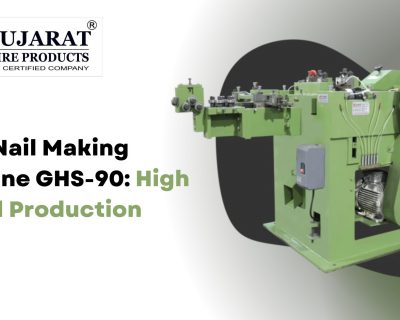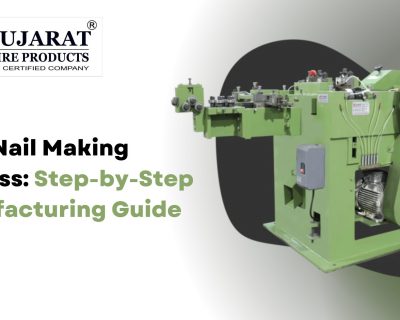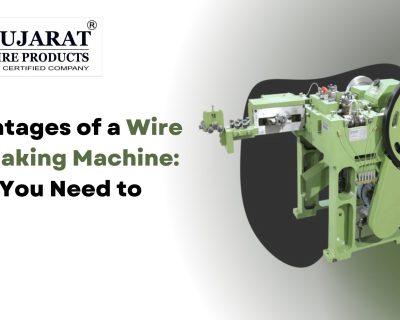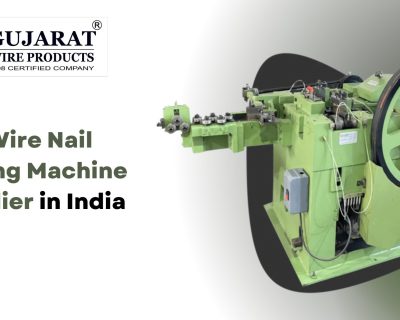Blog
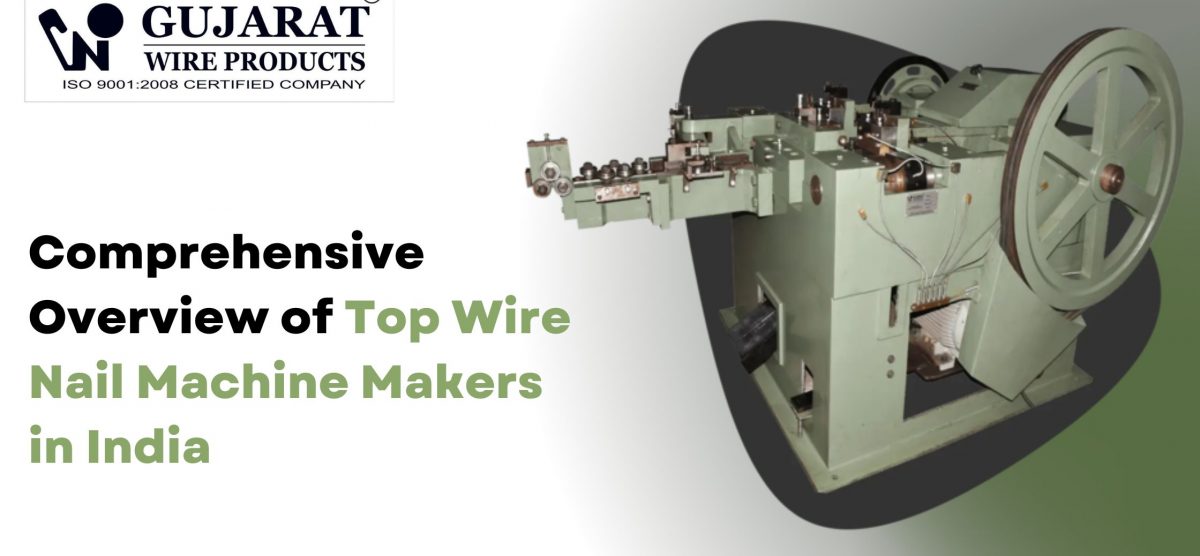
Comprehensive Overview of Top Wire Nail Machine Makers in India
Introduction
Buying a wire nail machine isn’t like ordering raw materials. Get the supplier wrong and you’re locked into a decade of downtime, spare parts shortages, and service calls that never get returned. India’s wire nail machine manufacturing sector is concentrated in three industrial belts—Rajkot leads the pack with the highest density of experienced fabricators and component suppliers. The Rs 4,000 crore Indian wire nail market grows at 8% annually, but machine reliability determines who captures that growth and who watches competitors scale. The challenge isn’t finding manufacturers—business directories list dozens. The real problem is identifying which ones deliver sustained uptime, accurate technical support, and parts availability five years after purchase. This guide examines the distinguishing factors that separate capable manufacturers from ones that look good on paper but falter during commissioning. It covers quality certifications that matter, technical capabilities worth paying for, and service infrastructure that determines long-term profitability.
Understanding the Indian Manufacturing Landscape
Geographic Concentration
Rajkot, Gujarat dominates wire nail machine production for practical reasons: decades of specialized toolmaking expertise, deep supplier networks for precision components, and proximity to steel wire sources. This concentration creates knowledge clusters where machine builders learn from each other’s failures and successes. Manufacturers in established hubs tend to have better-trained technicians and faster access to replacement components.
The fully automatic high-speed nail machine market in India shows 7.6% CAGR growth through 2035, driven by smart manufacturing initiatives and quality improvement mandates. Cities like Mumbai, Delhi, Chennai, and Pune are rapidly adopting automated systems as construction demand accelerates.
Key Evaluation Criteria
Manufacturing Quality Standards
ISO 9001:2008 certification signals process discipline—incoming material checks, assembly jig accuracy, spindle runout control, and pre-dispatch testing protocols. But certificates alone don’t guarantee performance. Look for manufacturers who implement Six Sigma procedures and maintain documented quality systems that visitors can audit.
The difference shows up in dimensional consistency. Top manufacturers produce machines that hold ±0.1mm tolerance on nail head formation across eight-hour shifts. Lesser operations deliver specs that drift after the first month.
Technical Capabilities That Matter
Speed specifications mean nothing without context. A machine rated for 500 nails per minute needs to sustain that rate with your actual wire quality and nail specifications—not just during a demo with premium wire. Request production-rate curves across your full nail length range before committing.
Critical technical factors include:
- Cut-off accuracy determining length variation
- Head formation concentricity affecting nail performance
- Changeover simplicity between nail sizes
- Feed mechanism reliability with various wire grades
- Operator ergonomics impacting sustained productivity
Service and Support Infrastructure
After-Sales Reality Check
Service response time matters more than purchase price over a machine’s lifespan. Manufacturers with export operations to Africa, Europe, and Asia typically maintain better documentation, training materials, and spare parts logistics. If they can manage international shipments and voltage variations, they’ll handle domestic support requirements.
Here’s what most buyers miss: operator training quality determines first-year productivity more than machine specifications. Manufacturers who provide documented work instructions and systematic commissioning protocols reduce the learning curve from months to weeks.
Spare Parts Availability
Check parts inventory before purchase, not after breakdown. Manufacturers operating for 40+ years typically maintain larger inventories of legacy components. New entrants often struggle with parts supply once production volumes change or suppliers consolidate.
Product Range Diversity
Machine Types and Applications
Leading manufacturers offer multiple machine configurations serving different market segments:
- Standard speed machines (200-300 nails/min) for established nail sizes
- High-speed automatic systems (400-500 nails/min) for volume production
- Specialized machines for coil nails, finishing nails, and concrete nails
- Integrated systems combining wire drawing with nail production
Range depth indicates engineering capability. Manufacturers who design multiple configurations understand the production variables affecting different nail types and customer requirements.
Technology Adoption and Innovation
Automation Integration
The shift toward Industry 4.0 drives small and medium manufacturers to adopt automated machinery with digital monitoring and smart control panels. These systems improve machine performance, minimize downtime, and enable remote diagnostics.
Energy efficiency creates ongoing savings. Modern machines reduce power consumption by 15-20% compared to designs from a decade ago, recovering the premium through lower operating costs within 24 months.
Quality Control Systems
Advanced manufacturers integrate inline quality checks that catch defects during production rather than after packing. Vision systems verify head geometry and length specifications at line speed, reducing returns and improving customer satisfaction.
Making the Selection Decision
Matching Capacity to Production Goals
Calculate your daily nail production targets across all sizes and styles. Then work backward to determine machine specifications, accounting for changeover time and realistic uptime percentages. Most operations achieve 75-85% utilization in practice, not the 95% shown in sales presentations.
Don’t buy capacity you can’t fill within 18 months. Oversized machines waste capital and floor space while undersized machines create bottlenecks that limit growth.
Due Diligence Steps
Before signing purchase orders:
- Visit operating installations similar to your planned setup
- Request sample nails produced across the full size range
- Review maintenance schedules and parts pricing
- Confirm training duration and format
- Verify warranty terms and response time commitments
- Test customer references independently
FAQs
What certifications should I look for in a machine manufacturer?
ISO 9001:2008 or newer versions indicate process discipline and quality management systems. Export certifications demonstrate capability to meet international standards. Six Sigma implementation suggests advanced quality control.
How important is the manufacturer’s location?
Geographic proximity to component suppliers and service technicians significantly impacts parts availability and response times. Established manufacturing clusters like Rajkot offer faster support than isolated facilities.
What’s a realistic production rate for automatic nail machines?
Sustained rates run 300-500 nails per minute for common sizes (1-3 inches) depending on wire quality and nail specifications. Peak speeds mean little if the machine can’t maintain output across full shifts.
Should I prioritize machine speed or reliability?
Reliability trumps speed. A machine running 85% uptime at 400 nails/min outproduces one running 60% uptime at 500 nails/min. Calculate effective output including changeover time and maintenance stops.
How long does commissioning typically take?
Plan for 2-3 weeks of installation, setup, and operator training with competent manufacturers. Faster timelines often indicate inadequate training that creates problems months later when the installation team has moved on.
What spare parts should I stock initially?
Maintain inventory of high-wear items: cutting dies, heading dies, feed rollers, and drive belts. Request recommended spares lists during purchase negotiations and verify availability before signing.
Conclusion
Choosing a wire nail machine manufacturer determines your production economics for the next decade. Focus on verified quality systems, technical capabilities matching your requirements, and service infrastructure proven across multiple installations. Request a detailed consultation to match machine specifications with your production goals.
Gujarat Wire Products has manufactured precision wire nail making equipment since 1975, serving operations across India, Africa, Europe, and Asia with ISO 9001:2008 certified machines. Based in Rajkot’s manufacturing hub, we maintain comprehensive technical support including installation supervision, operator training programs, and preventive maintenance planning. Our product range spans standard to high-speed automatic systems, integrated wire drawing solutions, and specialized nail configurations.
Schedule a factory visit and live demonstration—contact our engineering team at gujaratwireproducts.com to discuss your specific production requirements and evaluate machine options in operation.

